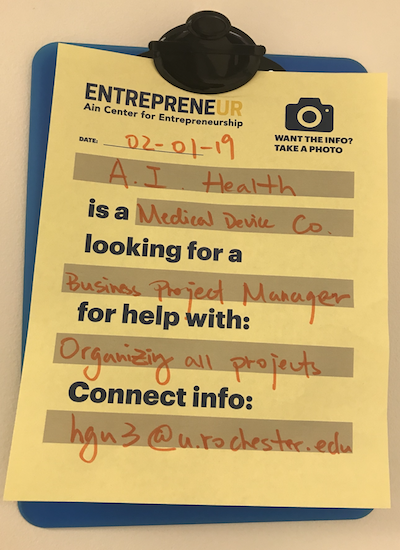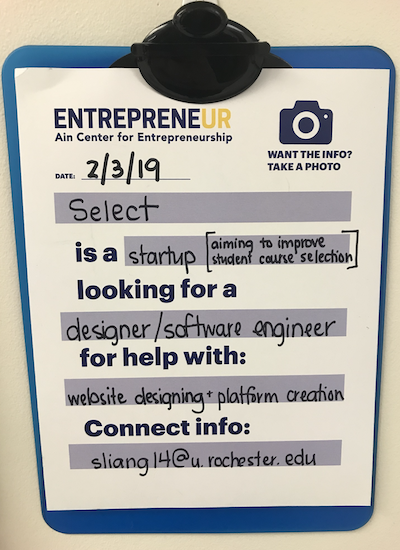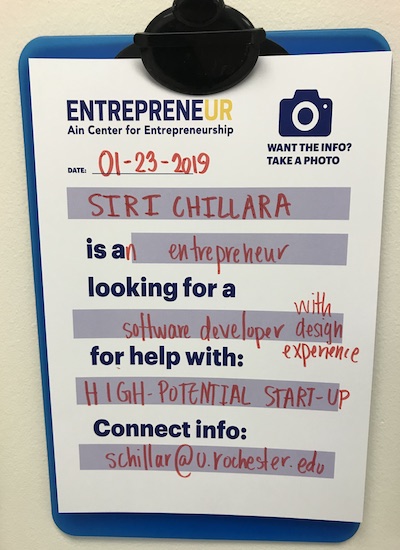The Importance of an Entrepreneurial Mindset in Each and Every Industry
As part of an annual Simon School program, Wallace Gundy (MBA candidate, Ain Entrepreneur Scholarship recipient, and Ain Team member) traveled to the West Coast to visit a number of companies and enterprises in a variety of industries. One thing she noticed? To be successful, entrepreneurship has to exist in all of them.
The Importance of an Entrepreneurial Mindset in Each and Every Industry
On December 1, I boarded a flight out of Rochester for the Simon School’s annual West Coast Trek. With 30 of my classmates, we planned to see twelve companies, hear keynotes from three alumni, attend two receptions, and meet with one expert recruiter, all orchestrated by the Jay S. and Jeanne Benet Career Management Center. From healthcare to search engines, travel to hardware, software to “uncarriers,” venture capitalists to restaurant owners, we heard and learned from an incredible range of alumni who are working in an even wider range of industries in the heart of Silicon Valley and Seattle.
These ten days on the West Coast opened up this East Coaster’s eyes to the culture, pace, cuisine, energy, and dynamic of what felt like another world. But, it also made clear, beyond a shadow of a doubt, that an entrepreneurial mindset is critical in order to thrive in every single industry, no matter what or where it is, and what your role may be.

It was only a day into the trip when several of us learned that the buzzword of these world-famous companies was “nimble.” Their most successful employees are able to adapt to different situations and circumstances, and the ever-evolving climates of their industries. Being nimble is at the heart of entrepreneurship. I have been fortunate to speak with many entrepreneurs during my time at Simon and prior; one of their first pieces of advice is always that it is critical to be able to adapt. A willingness to roll with the punches, make unexpected changes, thrive in ambiguity, and adjust plans is a key component in starting a successful business.
This nimbleness seems to be part of what makes entrepreneurship and the idea of building and owning something that is yours exhilarating. Each day is a new day, not always knowing what it will bring. This sentiment was exactly echoed on the West Coast. Fierce competition, economic unknowns, and our ever-changing world mean that no company knows exactly what the next day will bring. But, having an entrepreneurial mindset will set you apart from the rest.

I send a sincere thank you to Vicky Kamahele, Varian Medical Systems Inc., HPE (Nimble Storage), Western Digital/SanDisk, Mark Zawacki of 650 Labs, Google, Eric Ball of Impact Venture Capital, Juniper Networks, Intel, Applied Materials, T-Mobile, and Expedia for hosting us and sharing the incredible work you do. Hopefully it won’t be long before you’ll be working alongside more Simon grads!
Wallace Gundy ’20S (MBA) is a first year MBA candidate at the Simon Business School. She is a Forte Fellow and Ain Entrepreneur Scholarship Recipient. Pivoting from 10 years in the non-profit sector, she is pursuing Brand Management and Entrepreneurship. Wallace is involved in the Graduate Business Council and is an avid squash player. She hopes to own her own business one day.
Creative Collisions
Last semester, the Ain Center held the inaugural Creative Collision Challenge, a one-day competition that brings together students from a variety of backgrounds to tackle a pressing social issue. MBA candidate and Ain Teamer Gregory Scott competed in the Challenge, taking home third place with his team Bee Aware.
Creative Collisions
By Gregory Scott
One in three bites of all food is pollinated by bees. Yet, winter honey bee colony loss continues to reach unprecedented levels in various regions around the world. How should we protect our bees to ensure humans have adequate food supplies in the future?

The Creative Collision Challenge was held on November 16.

Supplies for beekeeping brought in by mentor Willa Powell.
The Creative Collision Challenge tackled this very problem. Ain Center staff combined students from unique academic backgrounds to analyze this dramatic decline in the bee population, brainstorm a solution, craft and deliver a ten-minute presentation within a four-hour window to a panel of expert judges. After pitching our slide decks, judges deliberated and awarded three cash prizes to the top-performing teams. And more importantly, teams got the chance to work on a pressing social issue and were challenged to generate and transform actionable ideas into enterprises that would actually create economic or social impact.
Shortly after the formal introductions, we all scampered off to various corners of Rettner Hall and began to ideate. My team consisted of four people from three different countries. Two of my teammates were engineers, one was an MBA student, and three of us had previous start-up/entrepreneurial competition experiences. While we worked, special experts and beekeepers from the Rochester community met with each group to discuss the process of beekeeping and even gave us a taste of real Rochester honey! After discussions with the experts and beekeepers, we began what in retrospect may have not been the most important discussion–our team name. After some rumination, we decided on the name “Bee Aware” and started to work on our slide deck. As we designed our deck, we realized that although the bee population reductions statistics are quite clear, the potential causes and solutions are not.

Team Bee Aware with a variety of mentors and subject matter experts during the one-day challenge.
As we scarfed down our Chipotle burrito bowls, we discovered that monoculture farming, climate change, and wifi are just three of the other purported factors that kill bee colonies. We needed to first agree on the most salient cause so that we could develop a fine-tuned solution. We decided that systemic pesticides were undoubtedly the largest harm to bees. After agreeing on the cause, we raced against the clock to organize our slides and do a dry run, as we would be first team to present.
At 1:44, one minute before the slide deck delivery deadline, Bee Aware submitted its slide deck. We had just enough time to do one rehearsal. Shortly after, all the participants reconvened in Creative Collision room for the presentations. We delivered our presentation and took questions from the panel of expert judges. The judges’ questions were helpful and gave my team a framework for how to deconstruct ambiguous issues in a short time-span and how to better substantiate our proposal.
After about fifteen minutes of deliberation, the judges decided that team BeeHouse’s technology enabled bee hive that incorporates live data transmission about bee health took home 1st prize. Our team’s three-tiered solution to ban systemic pesticides, subsidize beekeepers, and fund national bee research/education took home the 3rd place prize. 2nd place was taken by To Bee or Not to Bee who proposed a pesticide tax and subsidies to beekeepers.

Team Bee Aware: Aman Tugnawat, Lennard Emanuel, Samuel Howard, and Gregory Scott.
Despite not winning the competition, I had an awesome time at the Creative Collision Challenge. Not only did I learn about a complex social issue, but I was able to make new friends with a diverse set of classmates. As a result of the Creative Collision, I have also learned to try to avoid myopic views on a subject by listening to the ideas of my classmates. To build a truly innovative solution to a global issue, it is important that we leverage different academic and geographical perspectives. Lastly, the chance to eat local honey and see how actual beehives work really excited me about one day becoming a beekeeper myself.
Gregory Scott ’20S (MBA) is a first-year MBA student at UR’s Simon Business School. Greg also graduated from the University with a BA in International Relations in 2015.





